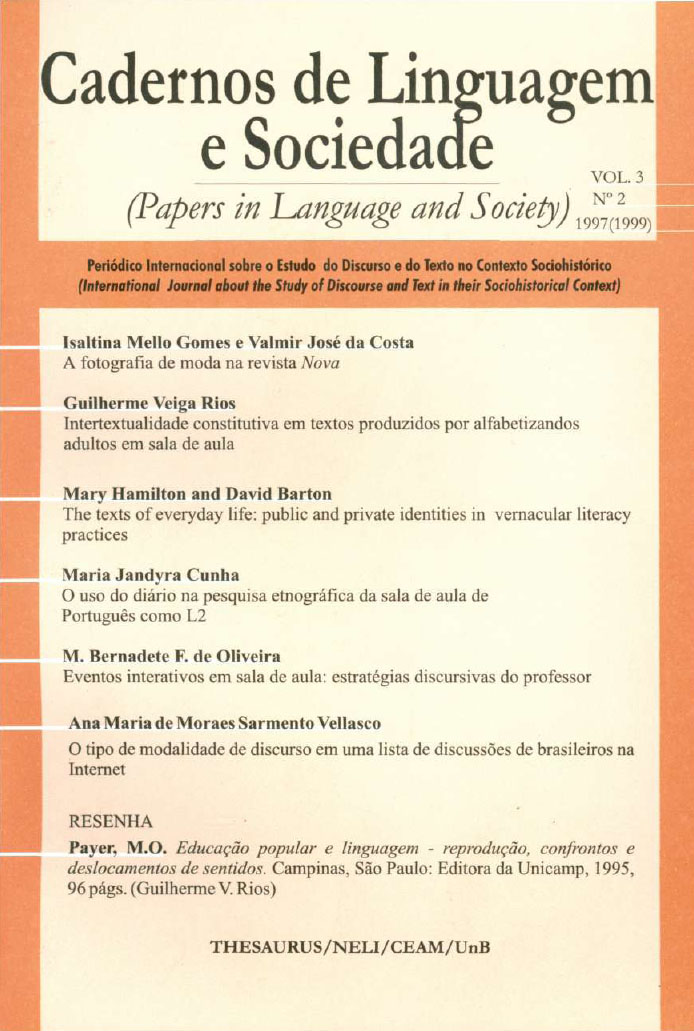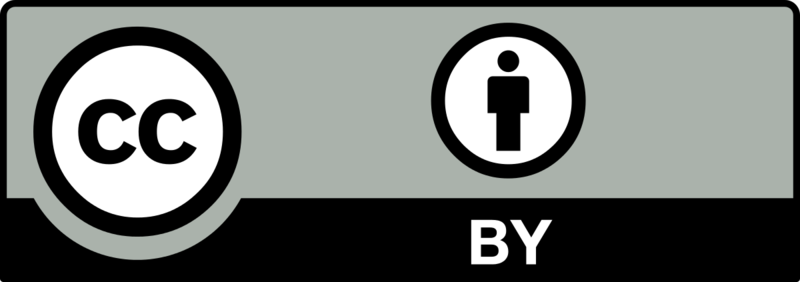The texts of everyday life
public and private identities in vernacular literacy practices
DOI:
https://doi.org/10.26512/les.v3i2.5779Resumo
This paper draws on data collected during an ethnographic study of literacy practices in one local community. It focuses on a case study of one woman, who was editor of a Residents Assocation newsletter and the editorials she wrote. We look at the “text world” of these editorials and examine the ways in which the editor positions herself in relation to the other inhabitants ”“ groups and individuals ”“ who populate this world. Three kinds of data were collected and juxtaposed in our research: observations of literacy practices, in-depth interviews with participants and the documents entailed in the literacy practices. This research, which starts from a study of literacy practices, leads us to discover new categories of vernacular texts ”“ in this case community group newsletters ”“ which provide a rich and
unusual source of data for exploring many issues to do with writer identity, genre, authorship and collaborative writing practices in everyday life. We argue that bringing together the study of practices and the study of texts offers an enhanced methodology for researching discourse in society.
Downloads
Referências
Barton, D. Literacy: An introduction to the ecology of written language. Oxford:Blackwell, 1994.
Barton, D. Hamilton, M. The web of literacies in local organizations. Paper presented to the British Association of Applied Linguistics Annual Conference, Southampton, September 1995.
Barton, D. Hamilton, M. Local literacies: reading and writing in one community.London: Routledge, 1998.
Barton, D. & Padmore, S. Roles, networks and values in everyday writing.In: Writing in the community. London: Sage, 1991, pp. 58-57.
Fairclough, N. (ed.) Critical language awareness. London and New York:Longman, 1992.
Gee, J. Social linguistics and literacies: ideology in discourses. Falmer Press, 1994.
Halliday, M. A. K. (1994) An introduction to functional grammar. Edward Arnold(2nd ed), 1994.
Hamilton, M. Histories and horoscopes: the ethnographer as fortune teller.Anthropology and Education Quarterly, 29(3) 347-356, 1998.
Hamilton, M., D. Barton & R. Ivanic (eds.) Worlds of literacy. MultilingualMatters, 1994.Heath, S.B. Ways with words. Cambridge University Press, 1983.
Ivanic, R. Writing and identity. Amsterdam: John Benjamins, 1997.
Padmore, S. Guiding lights. In: M. Hamilton, D. Barton & R. Ivanic (eds.)Worlds of Literacy, op cit.
Reder, S. Practice-engagement theory: a sociocultural approach to literacy across languages and cultures. In: Ferdman, M., Weber, R. and Ramirez, A. G. (eds.) Literacy across languages and cultures. State University of New York Press, 1994.Scribner, S. and Cole, M. The psychology of literacy. Cambridge, Mass.: Harvard University Press, 1981.
Schiffrin, D. Approaches to discourse. Oxford: Blackwell, 1993.
Silverman, J. Interpreting qualitative data: methods for analysing talk, text andinteraction. London: Sage, 1993.
Street, B.(ed.) Cross-cultural approaches to literacy. Cambridge University Press,1993.
Street, B. Social literacies: critical approaches to literacy in development, ethnography and education. London and NY: Longman, 1995.
Downloads
Publicado
Edição
Seção
Licença
Autores/as que publicam nesta revista concordam com os seguintes termos:
Autores/as mantêm os direitos autorais e concedem à revista o direito de primeira publicação, sendo o trabalho simultaneamente licenciado sob a Creative Commons Attribution 4.0 International license que permite o compartilhamento do trabalho com reconhecimento da autoria do trabalho e publicação inicial nesta revista.



